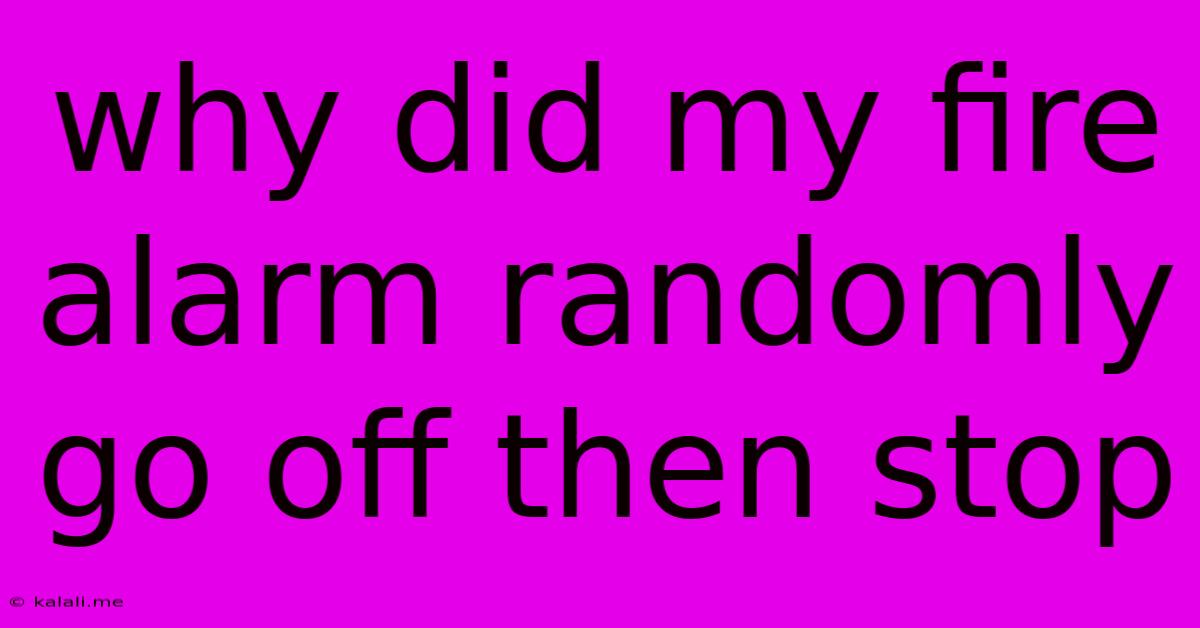Why Did My Fire Alarm Randomly Go Off Then Stop
Kalali
May 30, 2025 · 3 min read

Table of Contents
Why Did My Fire Alarm Randomly Go Off Then Stop? A Troubleshooting Guide
A sudden, unexpected fire alarm blare is unsettling, to say the least. The immediate panic subsides when it stops, but leaves you wondering: what caused it? This article explores common reasons why your fire alarm might have randomly gone off and then stopped, helping you troubleshoot and prevent future occurrences. Understanding the cause is key to ensuring your home's safety and peace of mind.
Common Causes of False Fire Alarms
Several factors can trigger a false alarm. Let's investigate some of the most frequent culprits:
-
Dust and Debris: This is a surprisingly common cause. Dust, insects, or other debris can accumulate within the smoke detector's sensors, triggering a false alarm. Regular cleaning is crucial for maintaining optimal functionality.
-
Steam or Cooking Smoke: Intense steam from showering, cooking, or even boiling water can sometimes confuse the smoke detector, setting off the alarm. Similarly, excessive smoke from cooking, particularly when searing or grilling, can also trigger the alarm, especially if the ventilation is inadequate. Consider using your kitchen exhaust fan when cooking.
-
Burnt Food: Burnt toast, popcorn, or other food items are notorious for setting off smoke detectors. This is because the smoke particles generated during burning mimic the presence of a fire.
-
Battery Issues: A low battery can cause erratic behavior, including intermittent alarms. While a consistently low battery will usually result in a chirping sound, a momentarily low voltage can sometimes trigger a full alarm.
-
Aging Detector: Smoke detectors, like any electronic device, have a limited lifespan. Over time, their sensors can become less sensitive, leading to both false alarms and an inability to detect actual fires. Manufacturers recommend replacing smoke detectors every 10 years.
-
Electrical Issues: Occasionally, an electrical surge or fault in your home's wiring might interfere with the detector’s sensors. If you suspect an electrical problem, it’s best to contact a qualified electrician.
-
Humidity: High humidity levels can sometimes cause condensation to build up inside the smoke detector, leading to a false alarm. This is especially true in humid climates or bathrooms.
-
Temperature Fluctuations: Extreme temperature changes, particularly rapid drops or increases, can affect the sensitivity of the sensor, resulting in a random alarm.
Troubleshooting Steps
If your fire alarm has randomly gone off and stopped, follow these steps:
- Check the Battery: Replace the battery, even if it seems fine. A slightly weak battery can cause erratic behavior.
- Clean the Detector: Carefully clean the smoke detector's sensors using a vacuum cleaner with a brush attachment or a soft brush. Avoid using harsh chemicals or abrasive cleaners.
- Test the Detector: Once cleaned, test the detector using the test button to ensure it's functioning properly.
- Inspect for Obstructions: Check for any dust, debris, cobwebs, or other obstructions near or around the smoke detector.
- Check for Nearby Sources of Smoke or Steam: Identify any recent cooking, showering, or other activities that might have caused the alarm.
- Consider the Detector's Age: If your smoke detector is over 10 years old, it's time to replace it.
Preventative Measures
- Regular Cleaning: Clean your smoke detectors at least once every six months.
- Battery Replacement: Replace the batteries annually, or as recommended by the manufacturer.
- Regular Testing: Test your smoke detectors monthly to ensure they're functioning correctly.
- Detector Placement: Ensure your smoke detectors are correctly positioned according to the manufacturer's instructions.
- Preventative Maintenance: Schedule regular inspections and maintenance for your home’s electrical systems.
By understanding the potential causes and taking the necessary preventative measures, you can significantly reduce the chances of experiencing another unexpected fire alarm. Remember, a functioning smoke detector is crucial for home safety, so addressing any issues promptly is essential.
Latest Posts
Latest Posts
-
Whether They Want To Or Not
May 31, 2025
-
How To Potty Train A Kitten Without A Litter Box
May 31, 2025
-
How To Remember Elements Of Periodic Table
May 31, 2025
-
What Is Microwave Capacitator Uf Mean
May 31, 2025
-
How To Wire 3 Lights To One Switch Diagram
May 31, 2025
Related Post
Thank you for visiting our website which covers about Why Did My Fire Alarm Randomly Go Off Then Stop . We hope the information provided has been useful to you. Feel free to contact us if you have any questions or need further assistance. See you next time and don't miss to bookmark.